
Osteospermum, is a genus of flowering plants belonging to the Calenduleae, one of the smaller tribes of the sunflower/daisy family Asteraceae. They are known as the daisybushes or African daisies. Its species have been given several common names, including African daisy, South African daisy, Cape daisy and blue-eyed daisy.

A wildflower is a flower that grows in the wild,the flower of a wild or uncultivated plant or the plant bearing it. Meaning it was not intentionally seeded or planted. The term implies that the plant is neither a hybrid nor a selected cultivar that is any different from the native plant, even if it is growing where it would not naturally be found. The term can refer to the whole plant, even when not in bloom, and not just the flower.
African daisy is a common name for several plants and may refer to:

Dimorphotheca ecklonis, also known as Cape Marguerite, African daisy, Van Staden's River daisy, Sundays River daisy, white daisy bush, blue-and-white daisy bush, star of the veldt, Kaapse magriet, jakkalsbos, Vanstadensrivier madeliefie, or Sondagsrivier madeliefie is a perennial ornamental plant that is native to South Africa. It features white ray florets and a dark blue centre and is part of the Asteraceae family. The species is named after Christian Friedrich Ecklon, a Danish botanical collector who explored the flora of the Cape in the early 1800s. It is regarded as an invasive plant in parts of Australia, particularly Victoria and Western Australia.

Dimorphotheca sinuata, the glandular Cape marigold, Namaqualand daisy, or orange Namaqualand daisy; syn. Dimorphotheca aurantiaca hort.) is a species of plant native to southern Africa. It is also widely cultivated as an ornamental and naturalized in parts of the United States, primarily California and Arizona.

Calenduleae is a flowering plant tribe of the family Asteraceae. Calenduleae has been widely recognized since Alexandre de Cassini in the early 19th century. There are eight genera and over 110 species, mostly found in South Africa.

Dimorphotheca is a genus of plants in the family Asteraceae, native to southern Africa. is one of eight genera of the Calenduleae, with a centre of diversity in Southern Africa. Species are native to Botswana, Eswatini, Lesotho, Namibia, South Africa, and Zimbabwe. Some species can hybridize with Osteospermum, and crosses are sold as cultivated ornamentals. The name "Dimorphotheca" comes from the Greek "Dis" "Morphe" and "Theka", meaning "two shaped receptacle", referring to the dimorphic cypselae, a trait inherent to members of the Calenduleae. Plants of this genus usually have bisexual flowers.
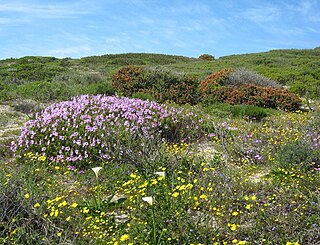
Cape Flats Dune Strandveld is an endangered vegetation type. This is a unique type of Cape Strandveld that is endemic to the coastal areas around Cape Town, including the Cape Flats.

Dimorphotheca pluvialis, common names white African daisy, Cape marigold, weather prophet, Cape rain-daisy, ox-eye daisy, Cape daisy or rain daisy, is a plant species native to South Africa and Namibia. It is sparingly naturalized in scattered locations in California.

Dimorphotheca cuneata, commonly known as the rain flower or white bietou, is a plant species native to the Cape Provinces and Free State of South Africa. as well as the Botswana and Namibia. It is also widely grown as an ornamental and reportedly sparingly naturalized in Gila County in the US State of Arizona.

Dimorphotheca jucunda, the delightful African daisy, is a species of flowering plant in the family Asteraceae. It is native to South Africa, Lesotho and Eswatini, and introduced to Ireland and Tasmania. As its synonym Osteospermum jucundum, it and two of its cultivars, 'Blackthorn Seedling' and 'Langtrees' have gained the Royal Horticultural Society's Award of Garden Merit.
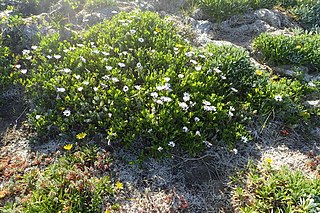
Dimorphotheca fruticosa, is a species of perennial herb native to coastal areas of South Africa. It is commonly known as trailing African daisy, and by its synonym Osteospermum fruticosum.

Dimorphotheca acutifolia is a plant belonging to the genus Dimorphotheca. The species is native to the Eastern and Western Cape Provinces.
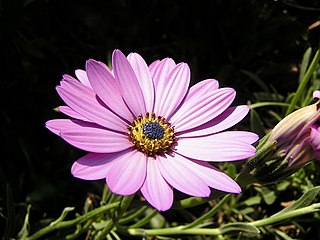
Dimorphotheca barberae is a plant belonging to the genus Dimorphotheca. The species is endemic to the Eastern Cape.
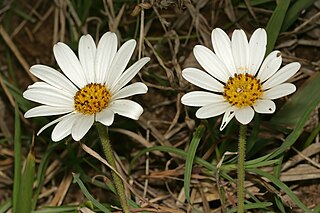
Dimorphotheca caulescens is a plant belonging to the genus Dimorphotheca. The species is endemic to the Eastern Cape, Western Cape and the Free State.

Dimorphotheca montana is a plant belonging to the genus Dimorphotheca. The species is endemic to the Western Cape.
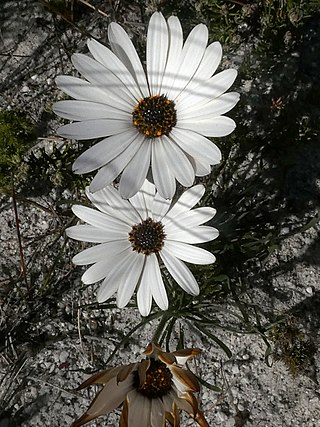
Dimorphotheca nudicaulis is a plant that belongs to the genus Dimorphotheca. The species is endemic to the Northern Cape and the Western Cape.
Dimorphotheca polyptera is a plant belonging to the genus Dimorphotheca. The species is native to the Northern Cape, Western Cape and Namibia.

Dimorphotheca spectabilis is a plant that belongs to the genus Dimorphotheca. The species is endemic to Gauteng, Limpopo Mpumalanga and North West.

Dimorphotheca tragus is a plant that belongs to the genus Dimorphotheca. The species is endemic to the Northern Cape and the Western Cape.

















